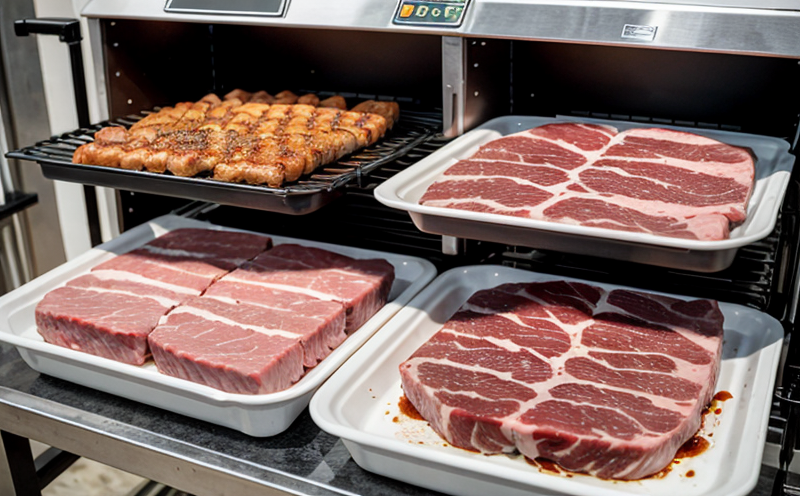ISO 28422 Heavy Metal Screening in Meat Products
The ISO 28422 standard addresses the screening of heavy metals in meat products, a critical aspect for ensuring food safety and quality. This service ensures that producers adhere to international standards set forth by ISO to prevent contamination with hazardous elements such as lead (Pb), cadmium (Cd), mercury (Hg), arsenic (As), and others which can pose significant health risks.
Heavy metals are naturally present in the environment, but they also enter food chains through agricultural practices, industrial pollution, or improper handling. Meat products, especially those derived from animals grazing on contaminated land or exposed to polluted water sources, may accumulate these elements. The ISO 28422 standard provides a standardized approach for identifying and quantifying heavy metals in meat samples.
The testing process involves several steps: sample preparation, digestion using appropriate acids, dissolution of the matrix, and subsequent analysis by atomic absorption spectrophotometry (AAS) or inductively coupled plasma mass spectrometry (ICP-MS). The method is designed to be sensitive enough to detect trace levels of heavy metals while ensuring accuracy and precision.
The significance of this service extends beyond mere compliance; it supports the reputation of food manufacturers by demonstrating their commitment to consumer health. By adhering to ISO 28422, companies can reduce legal risks associated with product recall due to contamination issues. Additionally, consumers trust brands that prioritize rigorous testing processes.
Compliance with this standard also enhances market access opportunities internationally. Many countries have stringent regulations regarding the presence of heavy metals in food products. Meeting these requirements not only opens doors but also establishes credibility among importers and distributors worldwide.
In summary, ISO 28422 heavy metal screening plays a vital role in safeguarding public health by detecting potentially harmful contaminants early on during production stages. It allows manufacturers to maintain high standards of quality while complying with global regulatory frameworks.
- Enhanced Consumer Confidence: Demonstrates commitment to safety and quality, which builds trust among customers.
- Increased Market Access: Facilitates easier entry into international markets where stringent food safety regulations are enforced.
- Risk Reduction: Minimizes potential health hazards linked with heavy metal contamination in meat products.
Quality and Reliability Assurance
At our laboratory, we employ advanced analytical techniques to ensure reliable results for ISO 28422 compliance. Our team of experienced scientists uses state-of-the-art instrumentation such as ICP-MS and AAS equipped with certified reagents and reference materials.
The process begins with rigorous sample collection practices designed to minimize contamination risks throughout the supply chain. Samples are then carefully prepared according to established protocols, ensuring consistent preparation across all batches tested.
Once prepared, samples undergo thorough digestion using nitric acid or perchloric acid depending on the matrix composition. After digestion, solutions are filtered if necessary and analyzed by either ICP-MS for trace element detection or AAS for higher concentration elements like lead and mercury.
Data interpretation follows strict guidelines outlined in ISO 28422 ensuring that results fall within acceptable limits specified by relevant authorities. Our laboratories maintain accreditation to relevant bodies such as ISO/IEC 17025, ensuring accuracy and consistency in our findings.
Our commitment to quality does not end with just the technical aspects; we also ensure timely delivery of reports containing detailed information about detected heavy metals including concentrations found along with interpretations based on applicable regulations. This comprehensive approach guarantees peace of mind for clients knowing every step has been meticulously followed according to best practices recognized globally.
International Acceptance and Recognition
The ISO 28422 standard is widely accepted across various regions, reflecting its importance in maintaining food safety standards. Countries like the United States, European Union member states, China, India, Brazil, Argentina, South Africa, Australia, New Zealand, Canada, Japan, Korea, and many others have incorporated this guideline into their national legislation.
Adherence to ISO 28422 demonstrates a company’s dedication to international best practices. This aligns with the global trend towards harmonizing food safety standards through internationally recognized norms rather than relying solely on local regulations which might vary significantly between jurisdictions.
Beyond regulatory compliance, there are numerous benefits associated with meeting these stringent requirements. Companies that comply can expect enhanced brand reputation and increased consumer confidence leading to stronger market positions. They may also benefit from reduced liability insurance premiums due to lower risk profiles associated with safer products.
Competitive Advantage and Market Impact
Implementing ISO 28422 heavy metal screening offers several competitive advantages that translate into significant market impacts:
- Enhanced Brand Reputation: By prioritizing food safety, companies can build strong brands trusted by consumers.
- Increased Customer Loyalty: Consumers appreciate businesses that go above and beyond to ensure product quality and safety.
- Precise Market Positioning: Meeting global standards positions a company favorably in international markets where stringent food regulations are enforced.
- Reduced Operational Costs: Early detection of contaminants through rigorous testing can prevent costly recalls later down the line.
- Innovation Opportunities: Compliance encourages continuous improvement and innovation within production processes to maintain high standards.
- Better Negotiation Power: Demonstrating adherence to international standards gives companies more leverage when negotiating contracts or partnerships internationally.
By integrating ISO 28422 into their operations, food manufacturers not only protect public health but also enhance their competitive edge in a highly regulated industry. This commitment to quality and safety fosters long-term relationships with stakeholders including suppliers, distributors, retailers, and ultimately consumers.





